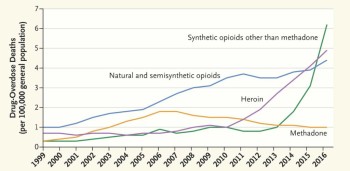FT Health: New fronts in the war over data

Roula Khalaf, Editor of the FT, selects her favourite stories in this weekly newsletter.
Our columnist Anjana Ahuja this week reports on an intriguing new aspect of the debate on the use and misuse of personal data. US investigators on the trail of the "Golden State Killer" uploaded an old genetic sample from the suspect to a genealogy website, enabling them to track down the killer via the DNA of his distant relatives.
So far, so good. But the fact that an individual’s genetic code can also reveal information about other family members throws up a new set of dilemmas around data ownership and privacy.
It’s not just genetics. As healthcare becomes increasingly digitised, conflicts over all sorts of medical data are becoming common, as shown by the UK government's recent demand the NHS hand over patient information in the pursuit of illegal immigrants. The move — criticised by MPs for state over-reach — was just the latest flashpoint in a battle that ignited in 2014 after ministers proposed to pool information from general practices and hospitals in a single national database.
Some bemoan the fact that we freely give away personal details for the convenience of using an app or free Wi-Fi but are reluctant to offer up health data to life-saving initiatives such as the new global cancer database. Yet the furore around the recent Facebook scandal suggests that the debate over the stewardship of personal medical information is only just beginning.
Three questions
We spoke to Trevor Mundel, president of global health at the Gates Foundation.
Why is malaria such an important focus for the Foundation?
We were shocked like most people by the numbers: after a lot of progress, they have plateaued, so we have made more [funding] commitments. You might have thought a vaccine and better drugs would work. It’s clear they don’t. Vector control is the pivot: we have new insecticides, two new nets, a project for whole-mosquito genetic sequencing. [We are exploring] toxic sugar baits and gene drive [a genetic engineering technology].
Why have we not made more advances in tackling pandemics?
There has been some progress since we were shocked by Ebola. We have some of the pieces of the puzzle but we have to understand how to deploy them. We need more simulations. It’s not clear everybody understands their role. There’s a lot of interest in a universal flu vaccine, with Phase 1 trials with GSK by the end of this year.
What is different about your new Medical Research Institute in Boston?
We are not going to have a bespoke building: this is about work, not a symbolic enterprise. It is a translational unit which ups the game for everyone. The pathways [it identifies] should be available to the whole community. It has to come as close as possible to open science. Because there is no commercial alignment [in its work], we have a more interesting relationship with regulators.
Chartwatch
Air pollution World Health Organization data show nine out of ten people across the world breathe polluted air. Some 97 per cent of cities in low- and middle- income countries with more than 100,000 inhabitants do not meet WHO air quality standards, compared with 49 per cent in their richer counterparts. There are almost 7m deaths a year from exposure to outdoor and household pollution.

FT Health reader event
London, May 21: Join FT journalists — including Leslie Hook, our new environment and clean energy correspondent — and our special guests to discuss air pollution and how to tackle it. Details and tickets here. Use discount code FTHEALTHREADER.

News round-up
Fighting flu Philanthropist Bill Gates has contributed $12m in seed money to the search for a universal flu vaccine — with the proviso that candidates are ready for human tests in 2021. Some say the money would be better spent on getting some vaccines already in development into testing. (Stat, NPR)
Humanitarian missions Up to 14m older people with disabilities receive inadequate treatment from humanitarian operations, according to a report. They are at greater risk of being left behind during emergencies and if they do escape, face additional barriers to being helped. A survey criticised media coverage of such emergencies as "selective, sporadic, simplistic and partial". (Help Age International, Irin)
Cancer scare A computer error meant 450,000 older women in England failed to receive potentially critical breast cancer screenings. The incident highlights the plight of a demographic group often neglected in the healthcare system. (Guardian)
Smoke signals Philip Morris in 2000 became the first tobacco business to publicly state that nicotine is addictive. But a study of company documents leads researchers to conclude “PM’s shift from denying to embracing nicotine’s addictiveness is an opportunistic attempt to maintain future profit and capitalise on tobacco harm reduction.” Another study alleges the industry positioned itself as a partner with Unicef to try to minimise anti-tobacco measures. (PLoS Medicine, American Academy of Pediatrics)
The US and global health Disease outbreaks abroad can have direct economic impacts in the US, says Rebecca Martin of the Centers for Disease Control and Prevention. This interactive map shows how US states benefit from the country's investment in global health. (Rabin Martin, GHTC)
Airborne alert Diseases from mosquito, tick, and flea bites tripled in the US from 2004 to 2016. The CDC called for improved tracking procedures and public health awareness programmes. (CDC)
Boozing Brits Scotland introduced the world's first minimum alcohol-pricing regime to combat problem drinking. Official data showed however that professionals and those with higher incomes were Britain's heaviest drinkers. (FT, ONS)

The business of addiction High-end addiction clinics are blooming as businesses tap into the lucrative market for wellbeing of the rich. “Excess champagne is just as toxic as excess corner-shop vodka,” says a consultant. (FT)
Sick building syndrome SBS is still hotly-debated in countries like Finland but sufferers fear being labelled as mentally ill while many doctors say the cause is primarily psychological. As one academic put it: "How much is that problem related to their environment or how much is it related to what they think might be in the environment?” (Mosaic)
Populations past A new website shows the changing demographics of the UK between 1851 and 1911 including data on mortality and the number of doctors. (University of Cambridge)

Medical ethics The switching off of a sick child's life support machine in the UK reignited the debate about who is best placed to make judgments on complex moral issues such as "the best interests" of a terminally-ill patient. (The Observer)
Post-partum depression A new film, Tully, is attracting fierce controversy for its portrayal of a condition rarely tackled on the big screen. (New York Times [spoiler alert], YouTube trailer)

Best from the Journals
Banking for health New financing partnerships with the private sector are essential to achieve equitable access to health services while the scale of investment needed makes global health a huge opportunity. Recommendations from this report include incorporating health considerations into financial analysis. (BMJ)

Holistic health Former New York mayor Michael Bloomberg's "health in all policies" approach — specifically on air pollution, diet, physical activity and anti-smoking measures — are analysed for their potential effect on heart health. In England, it is five years since public health responsibilities were moved from the NHS to local authorities. (Cities & Health, BMJ)
The power of nursing Patients at facilities in Kenya offered nurse-led antiretroviral services were more likely to be retained in effective HIV care and treatment after 12 months. (WHO Bulletin)
Drug strategies A study offers lessons from Canada on tackling US opioid overdose deaths. The UK's "enforcement-led" approach to illegal drugs does not work, but regulation might, argues an opinion piece in the BMJ. (NEJM, BMJ)
Hot tip Spending time in the sauna is already associated with a number of health benefits but a new 15-year study says it may also help reduce the risk of stroke. (Stroke)
Podcast of the week
'Ethical' drug marketing A discussion on how the 30-year old WHO rules for pharma marketing should be updated. (BMJ Talk Medicine, 26m)
Join the debate
Contact us via Twitter, Facebook, LinkedIn or email health@ft.com
Previous edition: Outfoxing the anti-vaxxers
Latest news at www.ft.com/health and Twitter @FT_Health
Final thought
Portion control A new study says shrinking portion sizes in food helps us recalibrate what we consider "normal" amounts to eat. Should food companies follow the advice in the face of the obesity epidemic? Or should the onus stay with the individual?

Comments